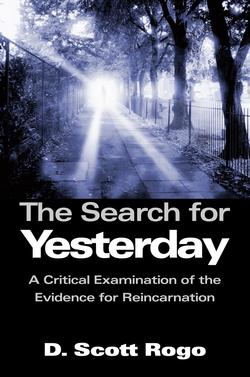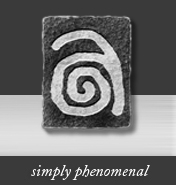
|
|
The Search for Yesterday
A Critical Examination of the Evidence for Reincarnation
by D. Scott Rogo
Trade Paperback, 256 Pages
$17.95, ISBN: 1933665076
Genre(s):
Paranormal
In this thorough and balanced account, researcher D. Scott Rogo offers a critical and scientific examination of reincarnation. He considers the various forms of past-life recall (dreams, waking visions, déjà vu), the most impressive case studies, and the history of research into reincarnation. He then concludes the book with an examination of explanatory models that can account for the phenomenon. Rogo concludes that some people can indeed tap into the memories of other people, cultures, and places long removed in time, but proposes that the evidence might be pointing to something more complex than our traditional views of reincarnation.
About the Author: D. Scott Rogo (1950-1990) was one of the most widely respected writer-journalists covering the field of parapsychology, as well as an active scientific investigator. Educated at the University of Cincinnati and San Fernando Valley State College, Rogo held a unique position in parapsychology and made many contributions to the field that deserve recognition. He served as a visiting researcher at the Psychical Research Foundation, then in Durham, North Carolina, and at the Division of Parapsychology and Psychophysics of the Maimonides Medical Center in Brooklyn, New York. He published papers on ESP in refereed parapsychological journals and was active in field investigations of hauntings and poltergeists. Rogo was also a leading authority on the history of psychical research; the breadth of his historical knowledge of the field was unsurpassed. Over the course of more than two-dozen published books, Rogo sought to broaden the range of topics worthy of paranormal research.
Visit the D. Scott Rogo Collection on Anomalist Books
EXCERPT FROM Chapter 7:
Attempting to track down and validate the memories of people who recall their past lives is excruciatingly difficult. Many people who remember such lives recall living several centuries ago, usually as obscure people in obscure places. Even verifying the simple historical existence of these people, or checking the historical accuracy of what is reported is nearly impossible in most instances. Nor is it an easy matter to prove that hypnotic subjects who come up with such stories did not already have the information stored somewhere in their unconscious minds. We pick up so much information about foreign people and places through our exposure to television and other media that our minds (both conscious and unconscious) have become cluttered repositories of a nearly infinite amount of data. Under the right conditions (such as hypnosis), such material is bound to surface. Given the fact that most people who are interested in pastlife recall already believe in reincarnation, it shouldn't seem odd that these recollections surface in the guise of "reincarnation" stories.
So how can you authoritatively verify the validity of past life recall? There seems no foolproof way, but one line of evidence has always struck those interested in this subject as probably the most crucial aspect of the extant literature on reincarnation. If a person were to suddenly develop a skill that related to a previous life, such a phenomenon would be strong evidence favoring reincarnation. For instance, if an auto mechanic remembered a previous life as a violinist and also remembered how to play the violin and really could do it, that would be true evidence of reincarnation. A skill is a learned attribute. We learn it by practice, and one cannot master a technical skill without this practice. Now, one skill we all learn during the course of our lives is language. We learn to speak by a process of cognition, imitation, rehearsal, and practice. If a person could recall and correctly use a language he allegedly spoke during a past life, this could be considered valid evidence of reincarnation. However, as more than one skeptic has pointed out, people who remember their past lives either spontaneously or through hypnotic regression rarely can demonstrate this skill.
But skeptics are often a hasty lot of people. The fact remains that a few reincarnation researchers have found their subjects talking in foreign languages. This phenomenon represents one of the precious few lines of evidence that reincarnation (or at least something akin to it) really occurs. It is, though, still a controversial area of exploration, as the following classic case illustrates.
Dr. F. H. Wood was an obscure British musicologist and organist who lived in Blackpool, England. Born in 1880, he would have lived an uneventful life had his brother not been tragically killed in a car accident in 1912. Since Wood held a long lived interest in the paranormal, he immediately set about making post mortem contact with him. England was full of mediums during this heydey of post Victorian spiritualism, but it wasn't until 1927 that Wood embarked on what would become one of the most complex cases in the annals of psychical research.
It was in that year that a friend of his, an amateur musician and singer, began experiencing spontaneous trances and bouts of automatic writing. Miss Ivy Carter Beaumont (called simply "Rosemary" in all the published reports on her mediumship) was a school teacher some thirteen years his junior. She knew of his interest in the paranormal and immediately told him about the strange experiences that were disrupting her life. Wood, ever hoping to find evidence proving the survival of the soul, took an immense interest in the case. His search to make psychic contact with his brother was soon abandoned, though, when an abrupt turnabout occurred in the case and Rosemary began bringing through messages from ancient Egypt. Not only did she begin speaking in the alleged language of those ancient times, but she gradually began recalling her own previous life along the Nile in some detail. By 1940 Wood had written three books on his investigation into the Rosemary affair, had collected some 5,000 phrases of ancient Egyptian, and had presented psychical research with a case so complex and controversial that even today it remains the focus of considerable interest.
Dr. Wood tells the story of Rosemary's mediumship in his first book, After Thirty Centuries, which appeared in 1935. When he first met her, the young school teacher's automatic writing had fully developed and she was receiving messages from a deceased Quaker woman. Messages were also being received from England's late prime minister. This phase of the Rosemary mediumship abated about a year later when a new entity appeared as a control. "Lady Nona" initially revealed only that she had lived in ancient Egypt, that her name had been Telika, and that she had been sent to Egypt from her native Babylon to wed the Pharaoh. Her nexus with the medium, she explained, came from their association in that past age in which Rosemary had led a previous life as a Syrian captive. Wood was naturally fascinated by the story and pressed the entity to explain how she could communicate so well in English. The entity responded by explaining that she could communicate by directly influencing the psychic's brain.
The appearance of Lady Nona also heralded a curious development in Rosemary's mediumship. The psychic now began receiving clairaudient messages from the Egyptian communicator that gradually augmented and superseded the automatic writing. Soon Lady Nona was deluging Wood with information about her Egyptian life. These communications also caused Rosemary to recall her own incarnation in Egypt by way of vivid mental pictures. Some of Lady Nona's revivications contained historically accurate information about ancient Egypt as well, primarily about the reign of Amenhotep IV (Iknahten), which impressed the investigator.
The truly unique aspect of the Rosemary mediumship was, however, Lady Nona's claim that she and the medium had lived at the same time in those ancient days. This created a special bond between them and added a surprising element to the case because talk of reincarnation was not at all popular among mediums, psychics, or spiritualists of the time. This bond allegedly gave Lady Nona the power to deliver, through her reincarnated friend, messages purportedly in the ancient language they had spoken together. These language tests, and the controversy they ignited, soon became the critical focus upon which the validity of the case ultimately hinged. The story of how these language tests came about is itself a fascinating one...
TABLE OF CONTENTS
Preface
1. Parapsychology and the Rebirth Controversy
2. Far Memory
3. In Search of Past Lives I: Selected Cases
4. In Search of Past Lives II. Culture, Bias, and Reincarnation
5. Hypnosis, Regression, and Reincarnation
6. New Light on Past Lives?
7. Xenoglossy I: Psychic Links with Ancient Egypt?
8. Xenoglossy II: Speaking of Past Lives
9. Past Life Therapy
10. Drugs, Consciousness, and Rebirth
11. Reconceptualizing Reincarnation
References
Annotated Bibliography
Index |



















